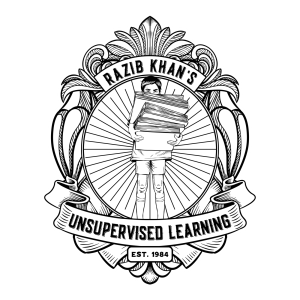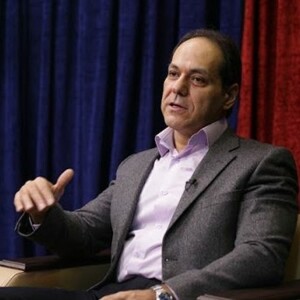

Razib Khan's Unsupervised Learning
https://unsupervisedlearning.libsyn.com/rssEpisode List

Claire Lehmann: after the Intellectual Dark Web
On this episode of Unsupervised Learning Razib talks to returning guest Claire Lehmann. Lehmann has an undergraduate degrees in psychology and English from the University of Adelaide. She was enrolled in a graduate program in psychology, but left it after becoming disillusioned with moral relativism, she went on to found the online magazine Quillette to reflect a more traditionally pro-reason and pro-evidence-based worldview. Within three years Lehmann was profiled in 2018 in The New York Times as a major figure within the nascent “intellectual dark web.” Razib and Claire discuss the evolution and current state of Quillette, a publication founded in 2015 to counter anti-enlightenment thinking, and later a platform for many thinkers associated with the intellectual dark web. Initially anti-left and anti-post-modernist, it later became known for its stance against cancel culture and woke ideologies, albeit without ever explicitly aligning with the American right. Lehmann clarifies her publication’s classically liberal stance. They also touch on the evolution and disintegration of the intellectual dark web, the corrosive impact of woke culture on academia over the last decade, and the likely future role of AI in disrupting traditional education. Lehmann also discusses the changing landscape of social media and public discourse, particularly the impact of Elon Musk's interventions at Twitter over the last few years. They also explore the "woke right" debate, alluding to the authoritarian tendencies emerging among ascendant conservatives, citing discussions of the topic by former Quillette contributor and editor Colin Wright and journalist Jesse Singal. Razib asks about the future of Quillette, and Lehmann talks about its new focus on long-form articles on culture, science and the arts, and addresses the magazine's pro-Israel stance, which has polarized some American readers that don’t understand why an Australia-based publication should take a strong pro-Zionist stance.

Nathan Cofnas: Judaism's group evolutionary strategy and hereditarianism defended
On this episode of Unsupervised Learning Razib talks to philosopher of science Nathan Cofnas, whose specialty is biology and ethics. An American, Cofnas is currently a Leverhulme Early Career Fellow in the Faculty of Philosophy at the University of Cambridge. He earned his Bachelor of Arts in Philosophy from Columbia University, and his doctorate in philosophy at the University of Oxford. His Substack is here. First, they discuss Kevin MacDonald’s theory of Judaism as a group evolutionary strategy, which is outlined in his three-book series, A People That Shall Dwell Alone: Judaism as a Group Evolutionary Strategy, Separation and Its Discontents: Toward an Evolutionary Theory of Anti-Semitism and The Culture of Critique: An Evolutionary Analysis of Jewish Involvement in Twentieth-Century Intellectual and Political Movements. Cofnas reviews his own critiques of MacDonald’s theory, and the reception they received professionally and from MacDonald’s large cohort of online fans. He also discusses the impossibility in obtaining a hearing for MacDonald’s response to Cofnas’ arguments in academia given anxieties today about so much as “platforming” offensive ideas. Razib brings up the evolutionary biological aspects of MacDonald's theory, and why there are reasons to be skeptical due to the unrealistic parameters of mathematical models required by MacDonald’s theories. They then turn to attempts to cancel Cofnas over his hereditarian views. Cofnas articulates his perspective that actually a woke-Left egalitarian perspective is probably the most rational position if you utterly reject hereditarianism, especially as regards group differences. Cofnas believes conservative arguments about the importance of culture in shaping outcomes have run their course. Finally, Razib presses Cofnas on the actual career prospects for a heterodox academic in the 21st century, and possible alternate routes to become a public intellectual.

Steve Hsu: China's inevitable rise and America's confused response
Today Razib talks to repeat guest Steve Hsu about China, a topic with so many currently relevant dimensions gIven the PRC’s clear emergence as an economic, military and political rival to the US. Hsu is a Caltech‑trained theoretical physicist who migrated from black holes to big data, co‑invented privacy tech at SafeWeb, helped found the biotech company Genomic Prediction, all while remaining a prominent public voice on genetics, intelligence and the future of human enhancement. He is also a professor of physics at Michigan State, and from 2012-2020 was vice president for research and graduate studies there. Razib and Hsu discuss whether China is innovating and how meanwhile American regulation and culture are stifling its domestic creativity. A proud Iowan, Hsu rebuts the notion that he is pro-China, seeing himself simply as a realist convinced that it is important to face the PRC head on and assess its strengths candidly. He and Razib talk about China’s demographic headwinds. Hsu points out the reality of demographic inertia. The generation already born in the 21st century is an abundant young workforce who will power the nation’s rise for the next 30-40 years; that disastrously plummeting fertility making headlines today is a concern post-dated for at least a generation down the road. They also discuss the quality of Chinese higher education, and the reality that the population today is far more educated than it was 25 years ago. Hsu also talks about possible cultural and biobehavioral differences between East Asians and Europeans, and addresses why South Asians seem to be better adapted to succeed in American corporate culture.

David Gress: Plato and NATO 25 years later
Today Razib talks to David Gress, a Danish historian. The son of an American literary scholar and a Danish writer, he grew up in Denmark, read Classics at Cambridge, and then earned a Ph.D. in medieval history from Bryn Mawr College in the US in 1981. During a fellowship form 1982-1992 at Stanford University’s Hoover Institution, he published on Cold‑War strategy, German political culture, and Nordic security. He has been a visiting fellow and lecturer at Gonville & Caius College, Cambridge, fellow at the Danish Institute of International Affairs, an assistant professor of Classics at Aarhus University, and professor of the history of civilization at Boston University. He co‑directed the Center for the Study of America and the West at the Foreign Policy Research Institute in Philadelphia and remains a senior fellow of the Danish free‑market think tank CEPOS while writing a regular column for Jyllands‑Posten. His breakthrough book, From Plato to NATO: The Idea of the West and Its Opponents (1998), argues that Western success sprang from a hard‑edged fusion of Roman order, Germanic liberty, Christian morality, and Smithian economics, rather than being a single disgraceful arc from Greco‑Roman‐paganism to secular Enlightenment that bypassed the Middle Ages. Razib asks Gress how he would have written Plato to NATO today, more than 25 years later, and he says he would have emphasized Christianity’s role in creating a unified Western culture out of Greco-Roman and Germanic diversity more. Gress also reiterates that he does not deny the Greek foundation of Western Civilization, but rather, his work was a corrective to a very thin and excessively motivated and partisan narrative that stripped out vast periods of European history. They also discuss Gress’ own own peculiar identity, the son of an American, born to a Danish mother, raised in Denmark who converted to Catholicism as an adult, and how that all fits into a broader European identity. They also discuss the impact of mass immigration on the national identities of Europe in the last generation, and Gress’ opinions as to the European future. Razib also asks Gress about the role that evolutionary ideas may have in shaping human history, and how his own views may have changed since From Plato to NATO. They also discuss when it is plausible to say that the West was a coherent idea, and whether the Protestant Reformation was the beginning of the end for the unitary civilization that was Latin Christendom.

Ethan Strauss: sports and the end of the culture wars
On this episode of the Unsupervised Learning podcast, Razib welcomes back Ethan Strauss, a writer who has covered sports and culture for the past decade, including in the book The Victory Machine: The Making and Unmaking of the Warriors Dynasty. More recently his writing is to be found at his Substack, House of Strauss, which is notable for offering a candid take on the cross-pollination between broader culture and athletics, notably in the piece Nike's End of Men: Why Nike no longer wants us to Be Like Mike. Strauss and Razib first discuss professional sports and the different representation of various nationalities. Strauss recounts the generational attempt by the NBA to get Chinese representation to gin up a lucrative rivalry, and how it sputtered due to the reality that 1.4 billion Han Chinese seem to have less basketball talent than small nations like Croatia. Razib also asks about how and why baseball is popular in parts of Latin America and East Asia, and why there are so many more Dominicans in MLB than Mexicans. Strauss says differences between populations are so obvious in sports there’s no need for complex social explanations. Then they explore the role of DEI in professional sports, and especially the NBA, and how it might be impacting decisions in the league. They recall the years around 2020, when a drive for minority representation, and in particular of blacks, was prevalent across the corporate world, and how thatimpacted professional sports. Strauss then offers his theory for why the Dallas Mavericks inexplicably traded away a potentially generational talent, Luka Dončić, and Mark Cuban’s role in the choice. Finally, he highlights the racism that Jeremy Lin, one of the few Asian American stars in the 2010’s, faced from fellow players.
Create Your Podcast In Minutes
- Full-featured podcast site
- Unlimited storage and bandwidth
- Comprehensive podcast stats
- Distribute to Apple Podcasts, Spotify, and more
- Make money with your podcast












